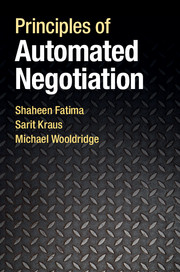Book contents
- Frontmatter
- Dedication
- Contents
- List of illustrations
- Preface
- Acknowledgements
- Summary of key notation
- 1 Introduction
- 2 Games in normal form
- 3 Games in extensive form
- 4 Negotiation domains
- 5 Strategic analysis of single-issue negotiation
- 6 Strategic analysis of multi-issue negotiation
- 7 The negotiation agenda
- 8 Multilateral negotiations
- 9 Heuristic approaches
- 10 Man–machine negotiations
- 11 Axiomatic analysis of negotiation
- 12 Applications
- 13 Related topics
- 14 Concluding remarks
- Appendix A Proofs
- References
- Index
13 - Related topics
Published online by Cambridge University Press: 05 November 2014
- Frontmatter
- Dedication
- Contents
- List of illustrations
- Preface
- Acknowledgements
- Summary of key notation
- 1 Introduction
- 2 Games in normal form
- 3 Games in extensive form
- 4 Negotiation domains
- 5 Strategic analysis of single-issue negotiation
- 6 Strategic analysis of multi-issue negotiation
- 7 The negotiation agenda
- 8 Multilateral negotiations
- 9 Heuristic approaches
- 10 Man–machine negotiations
- 11 Axiomatic analysis of negotiation
- 12 Applications
- 13 Related topics
- 14 Concluding remarks
- Appendix A Proofs
- References
- Index
Summary
We hope that by now you will have a good understanding of the scope and applicability of negotiation techniques, as well as a feel for the kinds of techniques used to analyse negotiation settings and build negotiating systems. Our aim in this chapter is to describe briefly some other research areas that are related closely to negotiation. Specifically, we discuss the domain of social choice theory (which is concerned with the general problem of group decision making using techniques such as voting), the area known as argumentation (which is about trying to make sense of domains when there are conflicting arguments about the domain), and fair division (which is concerned specifically with the problem of how to divide goods/resources among a group of agents).
13.1 Social choice
We begin by looking at the domain of social choice theory. Social choice theory addresses itself to the problem of how a group of agents can make a group decision when they have conflicting preferences. The mechanisms that social choice theory studies for this problem are typically voting procedures, in the sense that we are familiar with voting procedures in everyday life, where they are used for political decision making in democratic societies.
The basic setting considered in social choice theory is as follows. As usual, we have a set P = {1,…,|P|} of agents, who in this chapter we will often refer to as voters.
Information
- Type
- Chapter
- Information
- Principles of Automated Negotiation , pp. 224 - 232Publisher: Cambridge University PressPrint publication year: 2014
